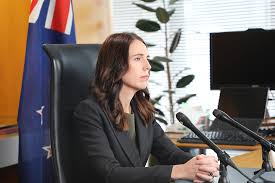With another record amount of COVID-19 cases identified, the New Zealand government has been granted extraordinary operating powers to implement a nationwide lockdown.
A State of National Emergency was declared by Civil Defence Minister Peeni Henare on Wednesday, following Prime Minister Jacinda Ardern’s issuing of an Epidemic Notice on Tuesday.
Those two measures have granted the government powers unseen in New Zealand since the 1951 Waterfront Dispute, a five-month industrial barney involving tens of thousands of workers.
The government has commandeered the defence force to assist police to uphold public safety and enforce the lockdown, which begins at midnight on Wednesday.
Police and civil defence personnel have been afforded a range of sweeping powers to close roads, take control of buildings and public spaces, and regulate and control the flow of food, fuel and essential supplies.
Ms Ardern said the pandemic required “a significant and coordinated response by and across central and local government” and for each citizen to minimise their contact by self-isolating.
“I do not take this moment in our history lightly nor the powers that come with it,” Ms Ardern said.
“But every decision that we are taking with the best interests of New Zealanders’ public health in mind.
“Unlike so many other gravely inundated countries, we have a window of opportunity to stay home, break the chain of transmission, and save lives.
“We must take this period of self-isolation deadly seriously.”
The consolidation of power comes with the blessing of the opposition, and with support from Kiwi citizens eager to see the containment of the spiralling pandemic.
A fresh 50 cases in the 24 hours to Wednesday morning has the country’s overall tally at 205.
As of Wednesday night, New Zealanders will largely be confined to their own homes in a lockdown far more severe than Australian restrictions.
Director of Civil Defence Emergency Management Sarah Stuart-Black said Kiwis pull through by calling on memories of varied tragedies and emergencies over the next month.
“Over recent years … we’ve had a range of emergencies where New Zealanders have listened to that advice and taken the right action to take themselves and their families safe,” she said.
“We’ve seen it in earthquakes and tsunami risk and fires and the mosque shootings. This is another challenge for us.
“We’re hoping that people have heard the messages and understand how horrendous this could get.”
Of New Zealand’s 205 cases to date, just six require hospital treatment and none are in intensive care.
Director-General of Health Ashley Bloomfield said numbers would continue to rise as households began to mandatorily self-isolate under tough new government restrictions.

